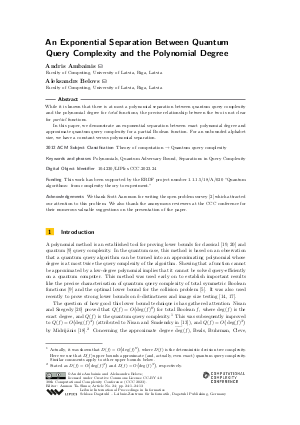@InProceedings{ambainis_et_al:LIPIcs.CCC.2023.24,
author = {Ambainis, Andris and Belovs, Aleksandrs},
title = {{An Exponential Separation Between Quantum Query Complexity and the Polynomial Degree}},
booktitle = {38th Computational Complexity Conference (CCC 2023)},
pages = {24:1--24:13},
series = {Leibniz International Proceedings in Informatics (LIPIcs)},
ISBN = {978-3-95977-282-2},
ISSN = {1868-8969},
year = {2023},
volume = {264},
editor = {Ta-Shma, Amnon},
publisher = {Schloss Dagstuhl -- Leibniz-Zentrum f{\"u}r Informatik},
address = {Dagstuhl, Germany},
URL = {https://drops.dagstuhl.de/entities/document/10.4230/LIPIcs.CCC.2023.24},
URN = {urn:nbn:de:0030-drops-182943},
doi = {10.4230/LIPIcs.CCC.2023.24},
annote = {Keywords: Polynomials, Quantum Adversary Bound, Separations in Query Complexity}
}

 Creative Commons Attribution 4.0 International license
Creative Commons Attribution 4.0 International license

